 Hormonal imbalances can significantly impact your overall health and well-being. They occur when there is an excess or deficiency of hormones in the bloodstream, leading to a variety of symptoms that can affect both physical and mental health. Understanding the causes, symptoms, and treatment options for hormonal imbalances is crucial for anyone experiencing these issues. This article will provide a comprehensive overview of hormonal imbalances, their treatments, and lifestyle changes that can help restore balance.
Hormonal imbalances can significantly impact your overall health and well-being. They occur when there is an excess or deficiency of hormones in the bloodstream, leading to a variety of symptoms that can affect both physical and mental health. Understanding the causes, symptoms, and treatment options for hormonal imbalances is crucial for anyone experiencing these issues. This article will provide a comprehensive overview of hormonal imbalances, their treatments, and lifestyle changes that can help restore balance.
Understanding Hormonal Imbalance
Hormones are chemical messengers produced by glands in the endocrine system. They travel through the bloodstream to various organs and tissues, regulating essential bodily functions such as metabolism, growth, mood, and reproductive processes. When hormone levels fluctuate beyond normal ranges, it can lead to a hormonal imbalance.
Common Hormones Affected
Several hormones can become imbalanced, including:
-
- Estrogen: Primarily affects female reproductive health and can influence mood and bone density.
- Progesterone: Plays a key role in the menstrual cycle and pregnancy.
- Testosterone: Important for male reproductive health and muscle mass.
- Thyroid hormones: Regulate metabolism and energy levels.
- Insulin: Controls blood sugar levels.
Causes of Hormonal Imbalance
Hormonal imbalances can arise from various factors, including:
-
- Natural Life Stages: Puberty, pregnancy, and menopause are periods when hormonal fluctuations are common.
- Medical Conditions: Disorders such as polycystic ovary syndrome (PCOS), thyroid diseases, and diabetes can disrupt hormone levels.
- Lifestyle Factors: Stress, poor diet, lack of exercise, and exposure to environmental toxins can contribute to hormonal imbalances.
Recognizing the Symptoms
Identifying the symptoms of hormonal imbalance is the first step toward seeking treatment. Symptoms can vary widely depending on which hormones are affected.
Common Symptoms in Women
Women may experience:
-
- Menstrual Irregularities: Changes in cycle length, heavy bleeding, or missed periods.
- Mood Swings: Increased irritability, anxiety, or depression.
- Weight Changes: Unexplained weight gain or loss.
- Skin Issues: Acne, dryness, or changes in skin texture.
- Fatigue: Persistent tiredness that doesn’t improve with rest.
Common Symptoms in Men
Men may notice:
-
- Low Libido: Decreased interest in sexual activity.
- Erectile Dysfunction: Difficulty achieving or maintaining an erection.
- Fatigue: Low energy levels and decreased motivation.
- Muscle Loss: Reduction in muscle mass and strength.
- Mood Changes: Increased irritability or depression.
Diagnosis of Hormonal Imbalance
To diagnose a hormonal imbalance, healthcare providers typically conduct a thorough evaluation, which may include:
Medical History Review
A detailed medical history helps identify potential causes of hormonal imbalance, including family history of endocrine disorders and lifestyle factors.
Physical Examination
A physical exam can reveal signs of hormonal imbalance, such as changes in weight, skin condition, and hair growth patterns.
Laboratory Tests
Blood tests are commonly used to measure hormone levels. Depending on the suspected imbalance, tests may include:
-
- Thyroid Function Tests: To assess thyroid hormone levels.
- Hormone Panels: To evaluate levels of estrogen, progesterone, testosterone, and others.
- Glucose Tolerance Tests: To check insulin levels and assess for diabetes.
Treatment Options for Hormonal Imbalance
Once diagnosed, various treatment options are available to help restore hormonal balance. The choice of treatment depends on the underlying cause and severity of symptoms.
Hormone Replacement Therapy (HRT)
HRT is often used to treat hormonal imbalances, particularly during menopause. It involves supplementing the body with hormones to alleviate symptoms such as hot flashes, night sweats, and mood swings. Types of HRT include:
-
- Estrogen Therapy: For women experiencing low estrogen levels.
- Progesterone Therapy: To balance estrogen levels and regulate menstrual cycles.
- Testosterone Therapy: For men with low testosterone levels.
Medications
In addition to HRT, various medications can help manage hormonal imbalances:
-
- Birth Control Pills: Regulate menstrual cycles and reduce symptoms of PCOS.
- Anti-Androgen Medications: Help manage symptoms like acne and excessive hair growth in women.
- Thyroid Medications: Such as levothyroxine for hypothyroidism.
Lifestyle Modifications
Making certain lifestyle changes can significantly impact hormone levels and overall health. Consider the following:
-
- Balanced Diet: Focus on whole foods, including fruits, vegetables, lean proteins, and healthy fats. Avoid processed foods and excessive sugar.
- Regular Exercise: Aim for at least 150 minutes of moderate exercise per week to help regulate hormones and improve mood.
- Stress Management: Incorporate stress-reducing techniques such as yoga, meditation, or deep breathing exercises.
- Adequate Sleep: Prioritize quality sleep by establishing a regular sleep schedule and creating a restful environment.
Natural Remedies for Hormonal Balance
In addition to medical treatments, some individuals may seek natural remedies to help balance hormones. While scientific evidence may vary, the following options are commonly explored:
Herbal Supplements
Certain herbs are believed to support hormonal balance, including:
-
- Maca Root: Often used to enhance energy and libido.
- Chaste Tree (Vitex): May help regulate menstrual cycles and alleviate PMS symptoms.
- Black Cohosh: Commonly used to manage menopausal symptoms.
Nutritional Supplements
Some vitamins and minerals play a crucial role in hormone production and regulation:
-
- Vitamin D: Supports overall hormonal health and immune function.
- Omega-3 Fatty Acids: Help reduce inflammation and support brain health.
- Magnesium: Important for regulating cortisol levels and promoting relaxation.
When to Seek Medical Attention
While some hormonal fluctuations are normal, certain symptoms warrant a visit to a healthcare provider. Consider seeking medical attention if you experience:
- Severe Symptoms: Rapid weight changes, extreme fatigue, or significant mood swings.
- Persistent Issues: Symptoms that do not improve with lifestyle changes or over-the-counter treatments.
- Family History: A family history of hormonal disorders or related health conditions.
Hormonal imbalances can significantly affect your quality of life, but understanding the causes, symptoms, and treatment options can empower you to take control of your health. Whether through medical interventions, lifestyle changes, or natural remedies, there are various ways to restore hormonal balance. If you suspect you have a hormonal imbalance, don’t hesitate to reach out to a healthcare provider for guidance and support. Taking proactive steps can lead to improved well-being and a better quality of life.
Our Medical Memberships Cover Hormonal Imbalance Treatment
Direct Primary Care (DPC) is a model of care where the patient pays an upfront monthly membership fee for high-quality and low-cost primary care. This means no surprise fees or being billed differently for sick visits versus wellness visits. This model is accessible to all. The focus of Direct Primary Care is ongoing wellness and prevention to prevent unnecessary hospitalizations or costly visits to the ER for primary care services.
> Learn More About Our Medical Memberships
Contact Us (727-312-1262) To Learn More!
—
 About Honeybee Holistic Health
About Honeybee Holistic Health
Honeybee Holistic Health strongly believes in a holistic, organic, and integrative model of care where the patient is the center of all decisions. Our approach is to empower each one of our patients to heal themselves and to make informed, autonomous decisions in their plan of care. This is approached by integrating modern medicine with well-studied homeopathic treatment options when appropriate.
> Learn More